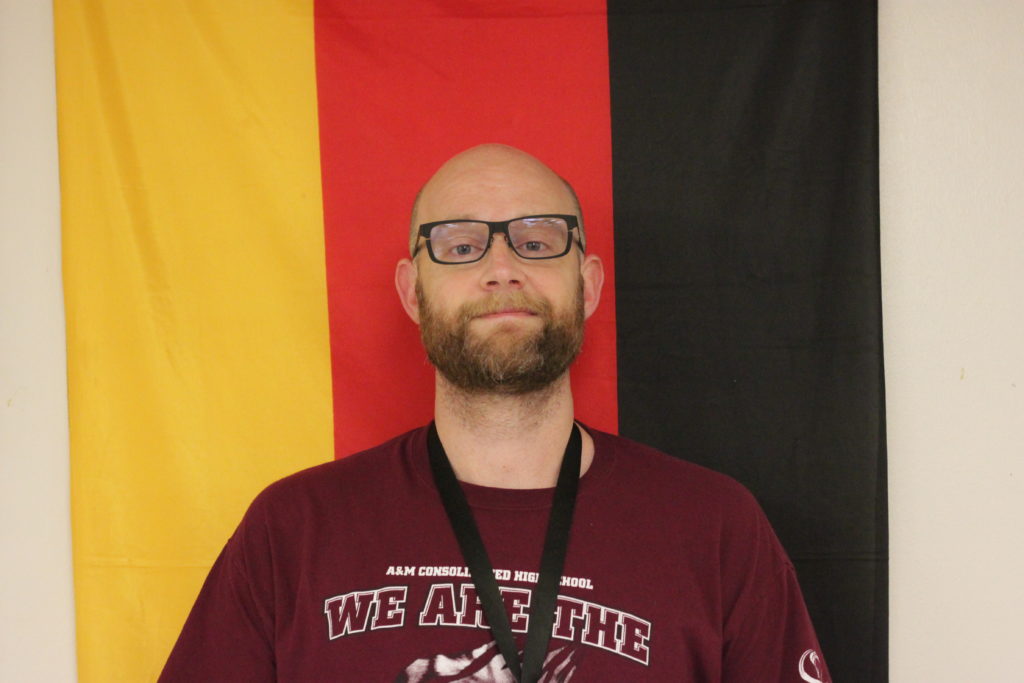
by Yanichka Ariunbold, assistant editor
The Roar interviewed German teacher Tim Yetter, who is known for his proficiency in multiple languages and teaching experience at the international level.
How long have you been teaching?
This is my first year back teaching public school in 8 years, but I’ve taught public school, high school, three years before that. I taught English in Germany at a corporate level for five years. So public school four total years, and total teaching nine.
Seeing as you’ve had experience teaching both teenagers and adults, how were they different as students?
With adults, there are not behavior issues, for the most part. The problem that I had with adult students is that because I also speak German, if they had an email that came to them in English, and they were in my English class, a lot of times there was this expectation that I just translate the email. And I’m like, I’m not you translator. We can work on it in class, but it’s not my job to do your work for you. So sometimes there were these expectations from the adults that were a bit odd.
What led to your interest in language?
I’ve always liked languages. I took German all throughout high school, and I took a bit of Spanish in high school. I was an exchange student in Denmark, and so I lived in Denmark for a year and learned Danish. I took three years of Russian in addition to a bunch of German in college, so I’ve just always liked it. I’ve always had an immense interest in language and zero interest whatsoever in math — and usually language people are math people, but I’m 100 percent in the language side. That’s enough for me.
How did your foreign exchange experience in Denmark influence you?
Initially, I really wanted to go to Germany, so initially I was disappointed when I got the letter back saying, “We’ve got a nice family and school for you in Denmark,” and I was like, “Oh man, Denmark.” But I kind of went with it, and I thought, going to Denmark, going to someplace where you know this is a language that only 6 million people speak — it was very unique, and so I got another language under my belt by the time I left Denmark because my Danish was very good. It just showed me another side of languages. That’s what I’ve always liked about foreign languages; it’s a different perspective on the world, and I think that’s interesting. In the future, in maybe the next four or five years, I’m going to try to teach English again, and I’d like to go to South America.
How many languages can you speak, and what are they?
Fluently, English and German. My Danish is still good, I can still understand it, but I haven’t lived in Denmark since I was 18, so 23 years, and when you don’t use it, you kind of lose it. There’s not a lot of people who speak Danish outside of Denmark. I can get by on Russian, because I took three years of it in college, which took a lot of studying, but I did well on it. And, my Spanish is okay — I can order food and ask for directions.
How has living in Germany impacted your teaching?
It’s kind of made me more understanding of minor differences in people. Living in Germany showed me that teenagers really aren’t so different. It’s not that German teens and American teens are identical; it’s that the problems students have, or the difficulties they face, it’s kind of universal. It crosses cultural lines. The good about American teens are similar to the good things about German teens, and the bad things are also similar too.
What’s one of your favorite experiences in Germany related to language?
There’s kind of those moments where you learn through humor, where I would say something that is technically not correct ad it sounded a little funny when I said it at the time. For example, there’s a word in German, “voll,” it means full, but you don’t use it when you’re talking about you or people, you use it when you’re talking about an object because if you use that word with people, it means stupid. So one nice lady, when we were having lunch with a group of people, she asked me if I wanted more of something, and I said, “Nein, Danke, ich bin voll.” I thought I said, “No thanks, I’m full,” but since I‘m a person, I actually said, “No thanks, I’m stupid.” It was kind of one of those learning moments.

